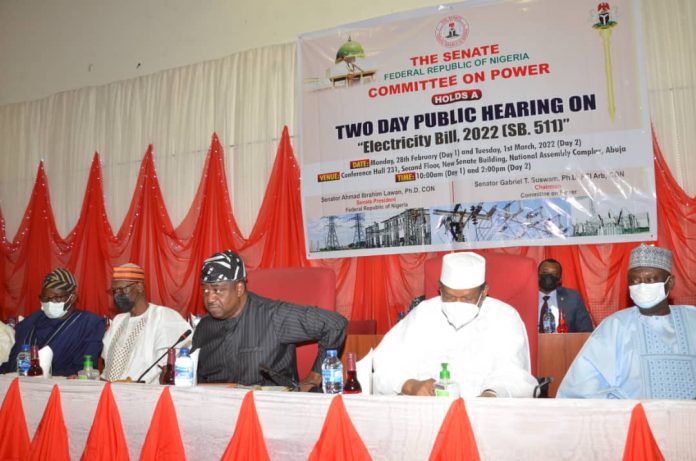The Nigeria Governors’ Forum (NGF) and Minister of Power, Engr Abubakar Aliyu have slammed the Draft Electricity Bill 2022 being considered by the Senate.
Indeed, while the Governors through a statement signed by their Chairman, Governor Kayode Fayemi of Ekiti State, said the proposed legislation was unconstitutional in view of the federal status of Nigeria, the Minister expressed his own reservations on the bill at a Public Hearing organised by the Senate Committee on Powers.
Specifically, the NGF in their objection to the bill said : “It would be unconstitutional and an unjustifiable act of overreach for the Senate to consider and pass a Bill that continues to treat the Federation as one single electricity jurisdiction or sector.
They said “while a single Electric Power Sector Reform Act may have been useful as a catalyst for the sector in the early years of the Fourth Republic, the States have all come of age, literally and metaphorically, and the arrangements must change in a way that accepts and respects the maturity of the States in electricity matters; a reality that this Senate Electricity Bill does not recognise and take account of but at best only pays the most cursory lip service.
“After 71 years of sole and unchallenged central control of the electricity sector, we live with an electricity sector divided into two parts.
“One part is the FG-controlled and -regulated national electricity market that today is insolvent, bankrupt and delivers no more than approximately 4,000MW/96,000MWh daily to 220m Nigerians, or an average of 18w/432watt-hours daily, barely enough to power two (2) 10-watt light bulbs a day.
“The other part of Nigeria’s electricity sector is the alternative/back-up market, whose estimated capacity is approximately 40,000MWso much so that Nigerian citizens are their own electricity providers in their homes, factories, schools, hospitals and places of worship.
“Our calculations indicate that if the 40,000MW of electrical back-up capacity owned and operated by Nigerians were to be delivered to them by licensed private IPPs and distribution companies through organised public electricity markets, Nigerian citizens and governments would have saved up to N17trn in 2021.
“Instead, this much money was bumt up via diesel and petrol generator operating/maintenance costs, instead of being saved and invested by private citizens and businesses and some of it captured by the States and Federal Government as tax revenues and levies. This has been the norm for decades and has worsened each year even as it seems set to continue in 2022 and beyond.
“It is in these circumstances that the Senate now has before it an Electricity Bill that does not address any of the challenges that threaten the sector and the nation. Rather, its key characteristics are a failure to recognise and provide for the rights of States to have their own electricity markets.
“The re-establishment of the same single national electricity market that has brought neither growth in capacity nor socio-economic development to the nation; and, as stated earlier, the continued absence of a clear path for the market to exit permanently from its long-running insolvent status”.
Additionally, the Minister threw his weight behind the bill but observed that some of its provisions are watering down the powers of Power Minister as coordinator and overall supervisory authority over the sector .
He said “Any such limitation on the power of the Minister has the potential to hinder efficient coordination of the Ministry and its agencies, impede the Minister’s ability for accountability as it hinders seamless reporting to the President”, he said.
Meanwhile, the President of the Senate, Ahmad Lawan and Chairman of the Committee, Senator Gabriel Suswam, said since the power sector reform Act 2005 is no longer sufficient for post privatization exigencies, a comprehensive legal instrument as envisioned with Electricity Bill 2022, is very necessary.

Call:
Sandra - 07069148333
Pauline - 08174374150
Scholastica - 09060678434













